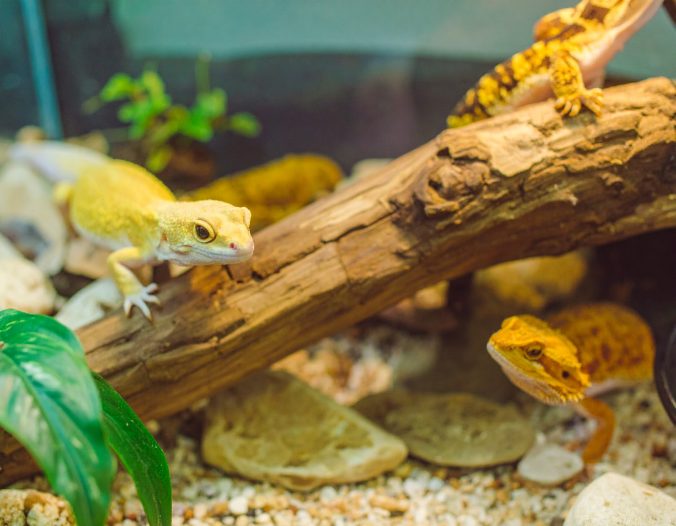Reptiles can make fascinating pets — calm, quiet, and often less demanding than furry companions. But with so many species to choose from, which reptiles are best for beginners?
Here’s a guide to some of the most beginner-friendly reptiles, what makes them easy to care for, and what to consider before bringing one home.
1. Leopard Gecko
Why they’re great for beginners:
- Hardy and tolerant of handling.
- Simple diet of live insects (like crickets and mealworms).
- No need for UVB lighting (though it can still be beneficial).
Basic care needs:
- A 20-gallon tank with a heat mat for belly warmth.
- Hides for security and a small moist box for shedding.
2. Corn Snake
Why they’re great for beginners:
- Docile, easy to handle, and rarely aggressive.
- Wide range of colours and patterns.
- Straightforward feeding (frozen/thawed rodents).
Basic care needs:
- A secure 20–40-gallon enclosure.
- A warm basking area and cool hide for proper thermoregulation.
3. Bearded Dragon
Why they’re great for beginners:
- Friendly, interactive, and often enjoy gentle handling.
- Fascinating to watch — full of personality.
- Omnivorous diet (insects + greens).
Basic care needs:
- A large tank (at least 40 gallons).
- Strong UVB lighting and a hot basking spot.
4. Crested Gecko
Why they’re great for beginners:
- Can live happily in room temperatures (no extra heating needed in many homes).
- Simple diet — commercial crested gecko food plus occasional insects.
- Doesn’t require as much space as larger reptiles.
Basic care needs:
- A vertical terrarium with lots of climbing branches and plants.
- Humidity maintained with daily misting.
5. Russian Tortoise
Why they’re great for beginners:
- Small for a tortoise species and hardy in the right conditions.
- Primarily herbivorous (leafy greens and weeds).
- Long lifespan (great for committed owners).
Basic care needs:
- A large indoor or secure outdoor enclosure.
- Strong UVB lighting and a dry, warm environment.
Things to Consider Before Getting a Reptile
- Longevity: Some reptiles live 10–20+ years — be ready for the commitment.
- Diet: Are you comfortable feeding live insects or rodents?
- Costs: Enclosures, heating, and lighting can be expensive upfront.
- Handling: Not all reptiles enjoy frequent handling — research species temperament.
The Right Reptile for You
Reptiles can be rewarding, low-noise pets — but they do have specific care needs. Choosing a beginner-friendly species is the first step to a successful reptile-keeping journey.
Want more? Stay tuned for our guides on reptile enclosure setups, feeding basics, and choosing the right heating and lighting.


Leave a Reply